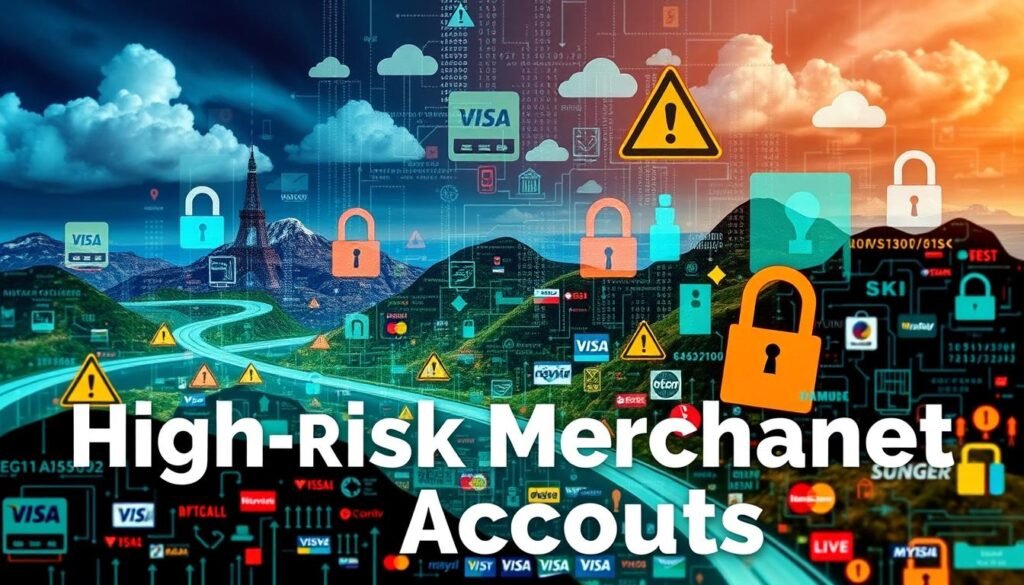
Did you know about 30% of online businesses are considered high-risk? The digital world is changing fast. Many areas like gaming, adult services, and travel face special payment processing hurdles. High-risk merchant accounts are key, offering tailored solutions for these businesses.
Secure online transactions are crucial today. For e-commerce businesses, knowing about these accounts is vital. They help fight chargebacks and fraud, keeping customer data safe. This part explains why these accounts are important for today’s financial dealings.
What are High-Risk Merchant Accounts?
High-risk merchant accounts help businesses that face special challenges in payment processing. These accounts are key for industries at high risk of chargebacks or fraud. They offer specialized services that are crucial for certain sectors.
Definition and Overview
High-risk merchant accounts are for businesses in high-risk industries. They have strict rules, advanced fraud protection, and higher fees. Sectors like adult entertainment, travel, and e-commerce often need these accounts.
These accounts are vital. They let businesses process payments safely, even with high risks.
Common Misconceptions
Many people think all industries are high-risk. But, only certain sectors meet the criteria for high-risk accounts. This clears up confusion and helps businesses understand their needs.

Why Certain Industries are Considered High-Risk
Some industries are seen as high-risk because of certain challenges they face. These businesses often find it hard to get stable financing and reliable payment processing. This is why they need specialized high-risk merchant accounts.
Examples of High-Risk Industries
Many sectors are considered high-risk due to their vulnerabilities. These include:
- Online gambling
- Adult content
- Travel services
- Multilevel marketing
- Subscription services
Risk Factors and Challenges
Businesses in high-risk industries face unique challenges. High chargeback rates can lead to financial losses and trouble with payment processors. They also have to deal with strict regulations that change by region.
These issues make it hard for these businesses to find reliable high-risk merchant accounts.

Benefits of High-Risk Merchant Accounts
High-risk merchant accounts bring special benefits to businesses, especially in tough industries. They offer flexible payment solutions, helping businesses deal with today’s financial needs. This is key in the fast-changing world of e-commerce.
Access to Payment Processing Solutions
High-risk merchant accounts give businesses special payment options. Regular banks often don’t work with high-risk businesses. But, companies like PayPal and Authorize.Net do, offering services just for them.
- Lower transaction fees than usual payment processors.
- Support for many currencies, making global sales easier.
- Works well with different e-commerce sites, making things smoother.
Flexible Payment Options for E-Commerce
Being able to take many payment types is a big plus. High-risk merchant accounts let businesses accept credit cards, e-checks, and digital wallets. This makes shopping better for customers, helping them buy more.
Good payment processing builds trust with customers, which is key for e-commerce growth. When customers feel safe, they’re more likely to buy. A smooth checkout and strong payment solutions make customers happy and keep them coming back.
Navigating High-Risk Payment Processing
Understanding high-risk payment processing means knowing about special payment solutions for unique businesses. Choosing the right solution is more than just basic functions. It’s about finding features that make transactions safe and efficient.
Overview of Payment Processing Solutions
High-risk merchants need special payment solutions that fit their needs. These solutions often include tools for managing risk and preventing fraud. They help businesses stay safe in a tough environment. Providers offer different options, like dedicated merchant accounts and aggregators, to handle high-risk transactions well.
Essential Features to Look For
When looking at payment solutions, some features are key for high-risk merchants:
- Fraud Detection Tools: Tools that spot and stop fraud can cut down on chargebacks.
- Chargeback Management: Good systems for handling and disputing chargebacks keep banks and payment providers happy.
- Transaction Security Protocols: Strong security, like encryption and PCI-DSS compliance, protects customer data.
- Multi-Currency Processing: Being able to process transactions in different currencies opens up more markets.
Looking at these features helps high-risk merchants pick a payment solution that fits their needs.
Choosing the Right Merchant Account Providers
Choosing a merchant account provider for high-risk businesses is crucial. It’s important to find a provider that fits well with your business. A good partnership can improve how you process payments and interact with customers. It can also help solve any problems that might come up.
Factors to Consider When Selecting a Provider
When looking at merchant account providers, there are key things to think about:
- Fees: Look at the fees, including transaction costs, monthly charges, and extra fees. High-risk businesses might pay more.
- Customer Support: Good customer service is vital, especially when problems happen. Make sure the provider offers 24/7 support.
- Integration Capabilities: See how well the provider’s services work with your current systems. This is important for online sales.
- Reputation: Check the provider’s reputation in the industry. Look at customer reviews and ratings to see how reliable they are.
- Risk Management Solutions: Find providers with strong fraud prevention tools and risk management for high-risk businesses.
Top Merchant Account Providers for High-Risk Businesses
Many companies offer merchant accounts for high-risk businesses. Each has its own strengths for this sector:
- PayPal: PayPal is known for its wide network and ease of use. It offers special services for high-risk accounts.
- Square: Square provides flexible payment options and has started to serve high-risk merchants.
- Durango Merchant Services: This provider focuses on high-risk accounts. They offer competitive rates and great customer support.
- PaymentCloud: PaymentCloud specializes in high-risk sectors. They are known for their quick response and custom solutions.
- eMerchantBroker: eMerchantBroker has a lot of experience with high-risk industries. They offer supportive services and knowledgeable staff.
How to Apply for a High-Risk Merchant Account
Applying for a high-risk merchant account needs careful attention. You must understand the process well. Having the right paperwork makes the application smoother. Also, knowing what to avoid can help you get approved.
Required Documentation
When you’re ready to apply, you’ll need certain documents. Here’s what you should get:
- Business licenses and permits
- Financial statements, including profit and loss statements
- Credit history reports
- Business plan detailing operations and sales projections
- Identification documents for business owners
This information helps the payment processor understand your business risk. It also makes sure you follow the rules.
Common Application Mistakes to Avoid
Many businesses get denied because of common mistakes. Knowing these can help you get a high-risk merchant account:
- Submitting incomplete documentation
- Failing to disclose all business activities
- Providing inconsistent information across different documents
- Ignoring the processor’s specific requirements regarding paperwork
By being thorough and honest, you can avoid these mistakes. This way, you can show your business in the best light.
Secure Online Transactions: Best Practices
Security is key in high-risk processing, especially for online transactions. Businesses must protect sensitive customer data. This ensures transactions are safe and trust is built.
Importance of Security in High-Risk Processing
High-risk processing faces unique security challenges. A breach can lead to big losses and harm reputation. Companies need to use strong security to fight fraud and cyberattacks.
Strategies for Ensuring Secure Transactions
Effective strategies make online transactions secure. Here are some best practices:
- Utilize SSL Certificates: These encrypt data between the website and users, making the connection safe.
- Implement Two-Factor Authentication (2FA): This adds an extra security step by asking for a second identity check.
- Conduct Regular Security Audits: Regular checks find vulnerabilities, allowing for quick fixes and defense against threats.
- Use Reputable Payment Gateways: Trusted gateways have built-in security for safe transactions.
Using these strategies makes online transactions more secure. It’s important for protecting assets and building customer trust.
Credit Card Processing and E-Commerce Businesses
Credit card processing is key for e-commerce businesses. It makes online shopping smooth, secure, and fast. This is crucial for keeping customers happy and coming back for more.
The Role of Credit Card Processing in Online Sales
Credit card processing is the heart of online sales. It lets e-commerce businesses take payments reliably. As more people shop online, having a good payment system is vital.
Studies show that businesses with great payment systems lose fewer customers. This means more money for them.
Integration with Online Payment Gateways
Connecting credit card processing with online payment gateways makes shopping easier. A good payment gateway makes transactions smooth. This builds trust and satisfaction with customers.
E-commerce sites that make this connection well see more sales. It shows how important the right payment tools are online. Read more articles..







